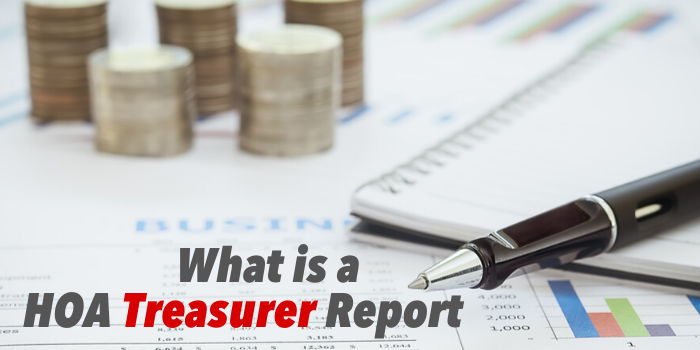The HOA treasurer has an important job, and it’s more than simply keeping track of the association’s funds. A treasurer’s duties include maintaining financial records, monitoring delinquencies, preparing budgets, obtaining insurance, and managing investments. They also work closely with the association’s CPA to arrange audits and ensure that taxes are filed properly each year.
On the Agenda
As they work to maintain the financial integrity of the HOA, the treasurer is responsible for compiling and presenting reports at board meetings. These reports help to keep the entire board up-to-date on association finances, and are crucial to maintaining a properly-funded community and avoiding costly monetary mistakes or issues.
Report Requirements
The format in which a treasurer’s report is presented will vary. Although many treasurers choose to provide written copies to the board, unless specifically stated in the association’s governing documents or mandated by state law, the report is not required to be in written format and may be given as a verbal statement made by the treasurer.
Treasurer reports may vary from association to association, but here are five essential items to include:
- Balance Sheet. The basic layout of a balance sheet should include assets (cash accounts, accounts receivable, prepaid insurance, etc.) and liabilities (accounts payable, prepaid homeowner balances, etc.), and will provide an accurate total of the association’s current assets.
- Profit and Loss Statement. This item will include two parts: first, the association’s income, and second, the expenses (utilities, office supplies, administrative services, etc.). It is also helpful to have a budget listed to identify any variances.
- Owner Balances. An owner balance summary report should include all homeowner accounts no matter their balance. The total, consisting of all receivable accounts and prepaid accounts, should match the figures in the receivables and prepaid sections.
- Payables Report. The total from this section, including all outstanding bills that the association owes up to a specific time frame, should match the liabilities section in accounts payable.
- Homeowner Deposits. Providing board members with a monthly homeowner deposit report gives them a breakdown of the homeowners’ standings and totals the actual income they have received that month.
Whether required by association bylaws or not, regular treasurer reports are crucial to monitoring the financial health of the association. With up-to-date financial information, boards are better equipped to make important decisions regarding the stability and progress of the community.







